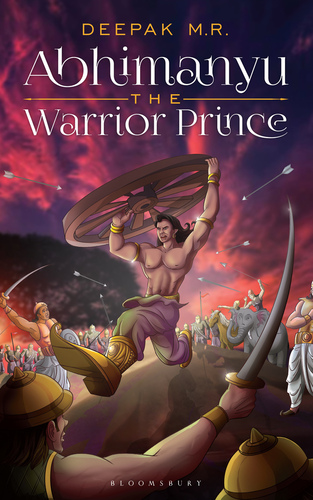Everyone knows the story of Abhimanyu. It is the story of a sixteen year old warrior who broke into Drona’s formidable Chakravyuha military formation and created havoc in the Kaurava camp. Single-handedly he battled the entire day with the Kauravas until he was finally killed in cold blood and through deceit by the Kaurava greats.
Is it right to call the son of Arjuna and Subhadra the mightiest warrior of the Great War? Isn’t it a bit too much to compare Abhimanyu with Arjuna, Bheema, and Karna, who fought on until the end?
This interesting statement made by Bheeshma is very telling.
“The mighty armed Abhimanyu … is equal in battle to Arjuna himself or Krishna. Endued with great lightness of hand in shooting weapons, and acquainted with all the modes of warfare, he is possessed of great energy.”

Bheeshma made this statement because he knew that Abhimanyu was destined to be a great warrior. He knew that being the son of Arjuna, he had the same prowess. He learnt the art of archery from Krishna’s son Pradyumna, who was none other than Kamadeva, who wielded a bow to strike at Shiva’s heart to melt it.
Abhimanyu was broad chested and born with strength. He was brought up to be a great warrior. He learnt the secrets of warfare and the knowledge of a few celestial weapons from his father. The might of Abhimanyu can be gauged from the fact that on the very first day of the war, he challenged Bheeshma.
One was sixteen and the other more than a hundred years old. One was fighting his first war while the other was a veteran whom even Parashurama could not defeat. Yet, with the confidence of youth, Abhimanyu challenged Bheeshma even as everyone looked on incredulously.
To everyone’s surprise, Abhimanyu broke Bheeshma’s bow and brought down his flag. The flag of Bheeshma that had a palmyra tree on it would create panic in the Pandava ranks when the soldiers saw it move towards them. The flag was brought down by a mere boy. This shows the prowess of Abhimanyu.
His achievements during the war are numerous. Even before the fateful day when the Chakravyuha was formed, Abhimanyu had many successes. He battled kings like Vrihadvala, Jayadratha, Shalya, and Paurava and defeated them.

On Day 13 of the war, the Chakravyuha was formed. Only Krishna and Arjuna knew how to breach it and they are taken away from the battlefield by Susharma and the Trigartas. Abhimanyu then volunteered to break into the formation. He told Yudhishtira that he did not know how to break out. Yudhishtira assured him that the Pandava army would be behind him.
Abhimanyu then smashed open the Chakravyuha and entered it. Unfortunately for him, before the Pandavas could join him inside, Jayadratha blocked them. In the past, Jayadratha had tried to abduct Draupadi and was punished by having his head shaved. A humiliated Jayadratha had then sought a boon from Lord Shiva, who had blessed him with the power to defeat all Pandavas, except Arjuna on any one day.
Using the power of his boon, Jayadratha held the Pandavas off for the entire day. Abhimanyu was trapped inside the Chakravyuha. Any other warrior would have been slain in no time. Abhimanyu’s valour was such that it seemed it was the Kauravas who were trapped by him.
He killed thousands of soldiers, chariot warriors, and elephant warriors. He defeated all the Kaurava greats including Karna, Duryodhana, Dushasana, Shalya, Kripa, Ashwathama, and many more. He made Duryodhana and Shalya faint thanks to his blazing arrows and they had to be taken away.
He killed Karna’s brother, defeated Karna’s son Vrishasena, and killed Shalya’s son Rukmaratha. Slaughtering the Kauravas by using his unparalleled archery skills, Abhimanyu humiliated Karna by defeating him four times and even injured him on his ear.

He then beheaded Duryodhana’s son and heir Lakshmana. The Kauravas then attacked him together, but were still unable to defeat him. Finally, they resorted to treachery. They betrayed the code of conduct that both sides had agreed to follow. Karna cut off Abhimanyu’s bow from behind while the others killed his horses and charioteer and broke his chariot.
He continued to fight from the ground using his chariot wheel. The picture of Abhimanyu wielding the chariot wheel is one of the most famous scenes of the Mahabharata. He then used his mace and continued to smash the Gandhara army. The Kauravas ruthlessly attacked him from all sides hurting him grievously.
Finally, Abhimanyu had a mace fight with Dushasana’s son. Both fell to the ground. Dushasana’s son got up first and used his mace to kill the valiant Abhimanyu in the most cold-blooded way. Abhimanyu was lying on the ground helpless and without his weapons when he was killed. It was a cold blooded murder that was a blatant violation of the code of conduct agreed before the war.
Abhimanyu’s death was a heroic one. He was a tragic hero who lost his life fighting until the very end. The entire Kaurava army could not defeat him and finally he could only be killed by deceit. His death changed the course of the war. It angered Arjuna so much that the next day, he not only killed Jayadratha but also (with Bheema’s help) killed seven of the eleven Kaurava akshauhinis (battalions).
Abhimanyu was truly a great warrior. He became a legend through his death thanks to his heroic efforts. At a young age, he exhibited heroism of the highest order. There is no doubt that he was one of the greatest warriors who fought the Great War, as great as his father, if not more.

